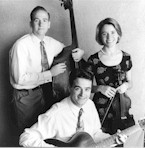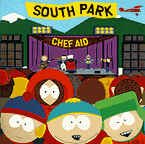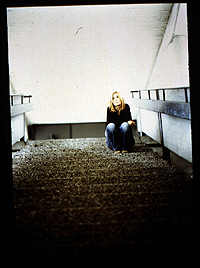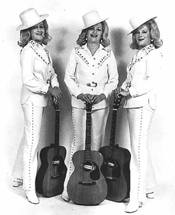December 14, 1998
CitySearch Music |
 |
|
by Steven Lighty, DX Barton, and Eric Diesel |
| |
 The Hot Club of Cowtown
The Hot Club of Cowtown
"Swingin' Stampede"
(Hi-Tone)
Finally, an album one can listen to comfortably while sipping corn whiskey and wearing a beret. The Hot Club of Cowtown's "Swingin' Stampede" combines western swing with traditional jazz; as the name may suggest, the group derives most of its influence from Bob Willis and the Texas Playboys and the Quintette Hotclub de France.
The trio—consisting of guitar, upright bass, and fiddle—dabbles in standards from Gershwin's "Somebody Loves Me" to Bob Willis' "My Confession." They stomp out old fiddle tunes like "Ida Red" and "Red Bird," and plod their way through old-timey numbers such as "T + J Waltz." The album remains faithful to the group's influences with simple arrangements and conventional playing. While handling most of the songs themselves, the Hot Club of Cowtown calls in some help on a few tunes, adding piano, steel guitar, and accordion. Johnny Gimble contributes another fiddle to a few numbers—although he's never played second fiddle to anyone, having graced albums and stages with Willie Nelson, Merle Haggard, and the original Texas Playboys.
Most songs have a primarily western feel, but a few tunes venture overseas, displaying a Continental influence. Guitarist Whit Smith and fiddler Elena Fremerman share vocal duties, doing their best Tommy Duncan impersonations; their solos are reminiscent of Django Reinhardt and Stephan Grapelli's slithering interplay. And occasional "yippie" or falsetto "a-haa" can be heard in the background during the adept soloing but, thankfully, no one hollers "Allez, chat, allez!"
A symbiotic relationship between the state of Texas and the nation of France will probably not be achieved in the near future, but this album may relieve some international tension. Someday a cowpoke dining at a bistro might refrain from murdering the waiter, and simply state, "Pardon, garcon, could you get this goddam bearnaise sauce off my T-bone," remembering fondly his happy moments listening to the Hot Club of Cowtown. —Steven Lighty

|
|
|
Various Artists
"Chef Aid: The South Park Album"
(American)
 Hey! Pretty soon it's going to be 1999, and that realization gives anyone pause, from the most whacked, millennial, death-cult aficionados to jaded junkie trash lying half-dead in the street. Falling somewhere in between, I've been contemplating the future too, and grasped quickly that I don't know enough to make any cogent, worthwhile predictions about what things to come will be like...
Hey! Pretty soon it's going to be 1999, and that realization gives anyone pause, from the most whacked, millennial, death-cult aficionados to jaded junkie trash lying half-dead in the street. Falling somewhere in between, I've been contemplating the future too, and grasped quickly that I don't know enough to make any cogent, worthwhile predictions about what things to come will be like...
Except to say that sometime around 2010, there's probably going to be a '90s revival, so all the stuff that you hate about now will be dug up and glorified and will probably look good through the thick haze of nostalgia combined with yet-to-be-developed evil marketing techniques. Remember how everybody used to know that, as sure as the sun rose in the east, disco sucked the root—but we all forgot about that and had to be cruelly re-educated by dressing in bad clothes and listening to the same music as our parents without the benefit of the good, cheap drugs they had.
One thing that will stand on its own merit is, surprisingly enough, this "South Park" album. I say surprisingly because most of these gimmick TV-based albums aren't very good. But "Chef Aid" manages to preserve the show's humor and adds some pretty cool tunes as well. The digital glory of Cartman's heartfelt arena-rock rendition of "Come Sail Away" totally kicks Styx's ass (like that's hard) and is genuinely moving to boot. And it's well worth the price to have such Chef classics as "Chocolate Salty Balls" and "No Substitute"—better known as the "Oh, Kathie Lee" song—forever available on CD. And such numbers as Master P's supercool "Kenny's Dead," Devo's demented "Huboon Stomp," and Perry Farrell and DVDA's "Hot Lava" are pretty damn good. Pretty goddamned good indeed is the brilliant mating of Ozzy Osbourne, Ol' Dirty Bastard/Big Baby Jesus, DMX, Fuzzbubble, and the Crystal Method on "Nowhere to Run (Vapor Trail)." (If the metal thing ever goes south, I really think the Ozzman's got a future in rap.) Also fantastic is Ween's "The Rainbow," where the boys fuse the Beatles with America (the band, not the country) and give it a hilariously deranged, yet totally tuneful, twist.
So if you're going to the yard to dig a hole for your time capsule, throw this CD in. When thieves down the line try and take your money by convincing you that abominations like Monica Lewinsky, Puff Daddy, Jennifer Love Hewitt, and "Dharma and Greg" are wistful reminders of a simpler, happier time, this album will be a good antidote. —DX Barton

Portishead
"Roseland NYC Live"
(London)
 As long as you're throwing stuff in the time capsule, be sure to toss in this album, if you can bring yourself to part with it. Because 10, 15 years from now, when they download directly into your cortex an ad for "End Times: Best Tunes of the Last Days" '90s revival boxed set, they'll have tons of stuff by Hole, Marilyn Manson, Beck, and other crap-foisters, but they're likely to forget all about Portishead. Like JS Bach and Vinnie Van Gogh, their genius may never be fully appreciated in their own time—but, like those artists, Portishead's work will hold up in times to come. Unlike most modern electronica/trip hop, Portishead doesn't sound like a bunch of high school kids who got hold of that CD-ROM music maker program they endlessly shill on MTV. Nope, they are real artists, and their live album makes you want to kick yourself repeatedly for not going to the show.
As long as you're throwing stuff in the time capsule, be sure to toss in this album, if you can bring yourself to part with it. Because 10, 15 years from now, when they download directly into your cortex an ad for "End Times: Best Tunes of the Last Days" '90s revival boxed set, they'll have tons of stuff by Hole, Marilyn Manson, Beck, and other crap-foisters, but they're likely to forget all about Portishead. Like JS Bach and Vinnie Van Gogh, their genius may never be fully appreciated in their own time—but, like those artists, Portishead's work will hold up in times to come. Unlike most modern electronica/trip hop, Portishead doesn't sound like a bunch of high school kids who got hold of that CD-ROM music maker program they endlessly shill on MTV. Nope, they are real artists, and their live album makes you want to kick yourself repeatedly for not going to the show.
A symphony-sized string section combined with Beth Gibbons' spooky, earnestly longing vocals and Geoff Barrow's spot-on scratching gives the powerful Portishead even more torque live, making their darkness flow like a rich, sweet, deadly fount from the nether depths. While many of today's touted electronic performers embarrass themselves and cheat their audience when they hit the stage, Portishead takes advantage of a live concert's immediacy and turns it up a whole belt full of notches. Gibbons, who may yet get her due as one of today's top vocalists, flashes the full range of her might on "Sour Times." "Humming" sounds even more like the perfect theme music for a really good horror film (if they ever make one of those again) than it does on the studio album. And "Glory Box" made me regret all the times I didn't give whatever romantic relationship I was in my complete effort and attention.
So if you like Portishead, you'll love this album. If you don't like Portishead, God help you, you're just not that bright. —DX Barton

The Del Rubio Triplets
"Jingle Belles"
(Karma)
 After the tussles of department store shopping, burning cookies during your annual seizure of domesticity, and the draining effort of avoiding chance viewings of "It's a Wonderful Life," "Jingle Belles" will make you feel better. It will remind of you of Christmases of yore, especially if your mom was one-third of an itinerant lounge act. With a repertoire of "1,000 songs in 6 languages," Milly, Elena, and Eadie Del Rubio have built quite a mythology in the decades they've hovered just below the pop-culture radar screen. Like all good lounge acts, they embrace vulgarity as they transcend it, all the while clinging to their fruitless faith that they will someday reach the Big Time.
After the tussles of department store shopping, burning cookies during your annual seizure of domesticity, and the draining effort of avoiding chance viewings of "It's a Wonderful Life," "Jingle Belles" will make you feel better. It will remind of you of Christmases of yore, especially if your mom was one-third of an itinerant lounge act. With a repertoire of "1,000 songs in 6 languages," Milly, Elena, and Eadie Del Rubio have built quite a mythology in the decades they've hovered just below the pop-culture radar screen. Like all good lounge acts, they embrace vulgarity as they transcend it, all the while clinging to their fruitless faith that they will someday reach the Big Time.
The Del Rubio Triplets surround themselves with an aural landscape of guitar, snare drum, squeeze box, one-string bass, ukulele, accordion, and harmonies as intricately wrought as the webbing on a screen door. No one but the Del Rubio Triplets could offer such schmaltz as "Have Yourself a Merry Little Christmas" and seem to really, truly, genuinely mean it. They cover two of the colors of Christmas ("White" and "Blue") with the pathos of Santa painted on black velvet. Their inspired medley of "The Christmas Polka" and "Jingle Bell Rock" will have you humming in delighted dementia as you bathe your present-wrapping wounds with Merthiolate. Their walk through the "Winter Wonderland" evokes the austere beauty of the Christmas lights on a trailer home's eaves, etched across the winter sky. They veer from covers of Yma Sumac ("Cu Cu Ru Cu Cu Paloma") to Dominique the Singing Nun, all with the warmth of true affection and none of swinger culture's pomo affectation.
Lest they be dismissed as a joke act, the Del Rubio Triplets offer the "Ave Maria Medley" of sacred song, once and for all relegating those longhair archivists to their rightful lower rung on the musical step-ladder. Benjamin Britten may have strung together ancient song into "The Ceremony of Carols," but, in Milly Del Rubio's own words, "God has chosen us to sing to the sick and retirees." That genuineness and generosity of spirit is what transfuses "Jingle Belles" as well as the Del Rubio Triplets' other groundbreaking platters ("3 Gals, 3 Guitars" and "Whip It"). Though campy, the Del Rubio Triplets are not camp. There is nothing bitter or cynical about them and "Jingle Belles" effortlessly evokes that feeling of childhood on Christmas Eve, as if all actually were right with the world. During a season when the only chimes ringing through the frosty air are cash registers, the Del Rubio Triplets gift us with the kind of holiday good cheer you are guaranteed not to hear piped into the holiday hell known as Macy's. What more can one ask of an act that totes their own instruments in a station wagon named Bambi, sews their own costumes, and lives together in a deluxe triple-wide mobile home? —Eric Diesel
Send feedback here.
|
|
|